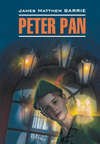Czytaj książkę: «A Widow's Tale, and Other Stories», strona 13
About a week later he went to the Square in the afternoon, whether wishing to see her or wishing not to see her it was difficult to say. He was told that Mrs Wargrave had gone up to have tea with the young ladies in the schoolroom, but could be called at once. It was a wet day, and probably she expected nobody. "With the young ladies in the schoolroom?" he repeated; "is there any one else?"
"There's only Mademoiselle," said the butler – "the governess, sir."
Charles Wargrave felt disposed to knock the fellow down for his impertinence; he had scarcely patience to desire him to show the way. How dared he speak of a lady so – a lady better than any one in the house, the pampered menial? He made the man an impatient sign to get out of the way when they came to the top of the house to the schoolroom door, which was sufficiently pointed out by the sound of cheerful voices within. He knocked, smiling to himself at the little Babel of noise, two or three speaking together; and was bidden to come in by a voice with a faint little parfum of foreignness in its sound, so faint as to be only discernible by the sharpest ears. A sudden flush came to his face as he heard it. It was not a voice, he thought, like the others. It was full of sweetness and yet of power – a voice round and harmonious like the notes of an organ, with nothing shrill or thin or common in it; a voice which suddenly brought before him again, not the dowdy governess, but the white-robed ministering angel. He felt himself flush with pleasure and expectation as he opened the door.
Mademoiselle was sitting opposite pouring out the tea. She had her back to the light, and he saw her in a kind of relief against the large window – the shape of her head, her hair a little loosened, not quite smoothed upon her brow, in the shining perfection of the other day. He saw her face in a luminous shadow, clear yet dusky, her eyes looking down, somewhat deeply set, the oval of their form and the hollow under the eyebrow clearly defined. She had not perceived him, nor did she even look up to see who was coming in in obedience to her invitation. It was only when the children made a sudden pause in their chatter with a cry of, "O Uncle Charles!" that Mademoiselle raised her eyes and stopped, with teapot in hand, to see who it was.
"Yes, it's me," he said, more cheerfully than grammatically. "I heard you were here, and I thought I'd ask Mademoiselle's permission to come in – and, perhaps, get a cup of tea – "
"Oh, come in, Charles," said Mrs Wargrave; "I'll answer for it you shall be welcome: we are all glad of anything to break the monotony of a long day."
Mademoiselle made no movement, gave no sign, except the faintest, scarcely perceptible bow of recognition. She found a clean cup for him and filled it with tea, calling one of her pupils to present it to him. She withdrew a little into the seclusion of her subordinate place while Mrs Wargrave took up the talk. It did not occur to the governess that she had anything to do with it. She had no great interest even in the visitor. The monotony of the long day was her natural atmosphere. She had no recognised need of anything to break it. Mrs Wargrave went on talking, and Mademoiselle heard and assisted now and then to keep the speakers going when she found that from the stranger, to whom the discourse was addressed, there was little response. And the children resumed their chatter sotto voce. As for Charles Wargrave, he sat still, saying very little, watching them all, but especially Mademoiselle, wondering how it was that such a woman could pass under a generic name, and bear, so far as the people around her were aware, no individuality at all. She withdrew from the centre of the scene, so to speak, in order to let the chief personages, Mrs Wargrave and her visitor, occupy it. Then, when it became necessary that there should be a response, or chorus, she disclosed herself by moments out of the background, just enough to keep up the action. He sat and watched them, watched her under his eyelids. Mrs Wargrave found Charlie more than usually taciturn, but felt that she was entertaining him – helping him to overcome his dulness, whatever might be the occasion of it. It never occurred to any one that he had another object, still less that his object could be in any way associated with Mademoiselle.
CHAPTER IV
It was not at once remarked in the Square that Mr Charles Wargrave had changed his habits in respect to his visits there, – that he came in the afternoon and at the hour of luncheon, and often declined invitations for the evening, which had previously been the time he generally spent with his cousins. This was partially accounted for, when it was noticed, by the reflection that during the height of the season the evenings of a young man who was to some extent a man of fashion and "went everywhere" were not his own. "He comes as much as he can," Mrs Leicester Wargrave said; "he comes when he can: of course he's full of evening engagements – three or four every night." She was, indeed, on the whole, pleased with the demonstrations of pleasure in her society, as she thought, which the young man showed. "He takes us just as he finds us. We have no inducements to offer him. He has such simple tastes. There is nothing he is so fond of as family life. He comes to me and the children just as if he were one of the family. Of course he is one of the family, but you would think he was either a son or a brother to see how that young fellow, to whom every smart house in London is open, comes and spends his afternoons with the children and me!" Mrs Wargrave was a little proud of the good influence which she felt she was exercising over her husband's cousin. He was becoming so domestic, so fond of home! He even sometimes met the children on their walks, and had taken them over to the Natural History place, and another time to the Kensington Museum. It was really too kind of him to think of the little girls.
During all this time, except on those two occasions when he had met the children, Charles Wargrave had not been able to secure any personal communication with Mademoiselle. She accompanied her charges with the greatest calm – a calm which was not at all complimentary to the young man who thus made himself her companion whether she would or not. She showed no signs whatever of embarrassment, or of supposing that his attentions might be misconstrued. If he had been eighty she could not have been more at her ease. And Edith and Dorothy had seized upon him on both sides, each clinging to an arm, which was not at all what he intended. He was so entirely discomfited, indeed, by the too much empressement of the little girls and the too little of Mademoiselle, that after these two accidental encounters he gave up attempting anything of the sort. However domestic he might be, it did not suit him to expound the Kensington Museum to Edith and Dorothy, each clinging to an arm. And was she made of stone, that woman? Was she made of vulcanite or some such impervious material, white to the sight but tough and unyielding to the touch? He was so much disgusted after that second expedition that he turned violently round upon himself and declared that he would have nothing more to say to Mademoiselle. What was Mademoiselle that she should exact such service? To be sure, it could not be said that she exacted any service; she smiled and ignored it with a perfect composure which was still more aggravating. And why should a man take all that trouble for a woman who took no notice, who never seemed to see anything, neither his civilities nor his impatience? He said to himself that it was in every way a mistake, that to pursue a person of that class was the height of folly, that to marry her would be madness itself. To marry a governess! a woman almost middle-aged, as Mrs Leicester Wargrave assured him so often – a foreigner – a nobody – above all, one who showed no appreciation of his attentions, and probably would not marry him! Oh, it was too much. He would break off at once and think of such folly no more.
This decision Charles Wargrave emphasised by going out of town for a whole week. But when he returned the first place he went to was the Square, just to see whether she was as composed as ever, he said to himself. As it happened it was in the afternoon, after the hour of luncheon and before that of tea, that he presented himself at Leicester Wargrave's house, and Mrs Wargrave was out. He paused a moment to think what he was to do; then, hearing the voices of the children, asked if they were in the garden.
"Yes, sir, with Mademoiselle," replied the servant.
"Then," said Charles, "I'll go out there, and you can let me know when your mistress comes in."
The garden was large and shady, and there was always something banal to say about the wonder of finding such a place in London, with omnibuses and hansom cabs on the other side of the house. He found Mademoiselle walking slowly round under the trees while the children played, and he felt sure that she gave a start when first she saw him – a quiver of astonishment and dismay. She might be dismayed and astonished for anything he cared. She might look all round for a way of escape; this time she should find none. Edith and Dorothy were in the middle of a game at tennis, and the governess was at some distance from them, taking a meditative walk. She was in a white dress, the first he had seen her wear since that night. It was a very still afternoon, the borders flaring with their late summer show of geraniums and all the foliage in full green, untouched as yet even by the heat and dust of London summers. He saw her before she saw him, walking along with her head bent a little, and an air of meditation and thought about her. She had a book in her hand, as if she had intended to read, but the soft stillness, the green shadiness, the warm, soft, drowsy air, had vanquished that intention. And then she perceived him and started with a slight glance round, as if she would have run away. No, no; not this time. He felt a kind of revengeful exultation in the suggestion of alarm which was in her startled movement. She was afraid then, after all her imperturbable airs!
It was, however, with the greatest composure that they met. She began at once to tell him how sorry she was that Mrs Wargrave was out.
"Oh, I can wait," he said; "I am in no hurry. She will come in by-and-by, no doubt."
"Not for some time, I fear," said Mademoiselle.
"Oh, I am in no hurry," he repeated, and, turning, walked with her. It was so sweet and still, and he found it so satisfactory to have at last got this impenetrable person to himself, with leisure to speak to her and nobody looking on, that for a time Charles Wargrave said nothing at all. It was pleasant to walk by her, to be conscious of the white figure by his side, so perfectly quiet and tranquil, not betraying by so much as a quiver of her dress anything of that alarm which he had divined in her at the first sight of him. For a minute or two he was quite satisfied with this; and it was to his surprise Mademoiselle herself who burst into those usual banal sentences about the strangeness of this garden in London, so secluded, so perfectly quiet, as if there was not a house or a vulgar sound within miles, while all the time the omnibuses were running, &c. He knew the words exactly, and had indeed meant to say them himself if other means of conversation failed.
"Yes," he said, "it is wonderful; but not so wonderful as some other things – for instance, to find you here, waiting upon the amusements of these two little – Mademoiselle, will you do me a favour?"
She looked up surprised – alarmed, too, this time, he felt sure – but said with a smile, "If it is anything in my power."
"It is quite in your power. It is very simple. Do you know that I have known you all this time without knowing you by anything else than the absurd official (if I may call it so) generic name of Mademoiselle?"
She coloured a little and laughed. "That is allright," she said, with one of the few slips she made in English, running the last two words into one. "It is an official title, and I am Mademoiselle. You would refuse to let an Englishwoman be called Miss, but with a Frenchwoman it is allright."
"I don't think it all right; I dislike it very much. Will you permit me the pleasure of being able to call you by your name?"
Mademoiselle paused a little. She was evidently doubtful which was the more dignified – debating between a reluctance to reply and a reluctance to permit it to be seen that she had any objection to reply. A denial, it appeared to her, might seem coquettish – a sort of challenge to a playful struggle. So she raised her head and answered, "I am Claire de Castel-Sombre," with the air of a queen.
"Ah," said Wargrave, "I thought as much. Is it out of pity for us as nobodies, with a name never heard of till our grandfathers went into business, that you have concealed, Mademoiselle de Castel-Sombre, un si beau nom?"
"I have not concealed it," she said with a smile. "Mrs Wargrave knows my name; but why waste breath upon so many syllables when Mademoiselle answers every purpose just as well?"
"That is a little scoff at us as industrials – not willing to waste anything, even our breath."
She shook her head. "I will not be tempted into an argument."
"No?" said Wargrave, changing rapidly from one language into the other. He knew French well, which is not too common with young men about town, and he was proportionately pleased with his own acquirement, and glad to note the little start of light and colour in Mademoiselle's face. "You are too proud to argue or even to assert the difference between an old noble name of Béarn and a common English one which, on the foundation of a little money, sets itself up as something, and condemns a woman like you, such a woman as you, to give up every attribute of real life and waste all your gifts and become an abstraction for the benefit of two – "
"Stop, stop!" she cried; "you are going a great deal too far. I am not compelled to anything. I am doing only what it is my business to do, in circumstances which are unusually comfortable and favourable. I do not know what can have put such an idea of my situation into your mind."
"It is very easy to explain that," he said. "My indignation has been growing since ever I made your acquaintance. As if you did not know very well that there is nobody in this house at all your equal, either in family and breeding – which are, perhaps, accidental advantages, for, of course, to have them you had only to give yourself the trouble of being born – but also in mind, in heart – "
She put up her hand to stop him. "Mr Wargrave, you are under some strange delusion. I am neither very clever nor very highly instructed, nor capable of anything above what I have to do. As for breeding, I was trained to be a governess as I am. Oblige me by giving up this subject, which can lead to nothing but misunderstanding. I possess nothing but that beau nom of which you form so great an idea. Of all visionary things to stand upon, is not birth the most visionary? Certainly it is so in my country: and ought to be still more in yours, which is so practical – "
"Mine is not practical at all," said Wargrave; "that is one of the mistakes you make. You are far less affected by romantic reasons than we are. I have always thought so, and more than ever now."
She said nothing, but with a little movement of her hand seemed to wave his argument away. "These things are beyond discussion," she said.
"That may be; but you cannot imagine that one can look on and see such a sacrifice, and not earnestly protest against it?" Wargrave said.
Mademoiselle laughed – half pleased, half provoked. "You force me into a discussion," she said. "I don't know what to say to convince you that I am very well off, and desire no better. If I was not doing this, what should I do?"
She turned and looked him in the face as she put this question, half angry, half flattered, amused also at the young man's curious earnestness and excitement. The look was unexpected, and caught him full in the eyes. He made a hurried step backwards, and uttered an unconscious exclamation.
"There is nothing," she said, quickly – "nothing else that I could do. Do not disturb with such suggestions a woman working for her bread. One might have had other dreams when one was young. But life is very different from one's dreams. I am very well off; and there is nothing else that I could do."
"Yes," he said, drawing a long breath, "there is something else. I must say it – you could marry me."
She looked at him again with consternation, falling back a little, drawing away, her eyes opening wide with amazement, and made no answer for a moment. Then she said in a soothing tone, "Mr Wargrave, don't you think you had better go home?"
Charlie was piqued beyond measure by this speech. "I believe she thinks I am out of my mind," he said.
"It looked like it for a moment." She gave a little, low, uneasy laugh. "You have given me a great fright. Pray go in at least, and lie down upon the sofa till Mrs Wargrave comes in."
"Do you think me mad?" he said.
Her eyes dwelt upon his face with a serious doubt. "I think – the sun has been too much for you. Your head is a little confused, Mr Wargrave. Don't let us talk of it. I am quite sure that you did not mean to be rude."
"Rude!" he cried; "Mademoiselle de Castel-Sombre, you are very cruel to me; you wound me deeply. I made you a very serious proposition, and you treat me as if I were insane."
"Temporarily," she said. And at this moment there came an interruption unexpected on his part. The two little girls had finished their game, and they came with a rush, both together, upon Uncle Charlie, as they called him, pushing between him and Mademoiselle, and breaking up the situation in a moment. Edith and Dorothy seized him and clung to him, hanging one on each arm. "O Uncle Charlie, where have you been? What are you doing in the country? Why, everybody is in London at this time of the year."
"Ask this lady what I was doing – she knows," he replied, not without an effort to cast them off: but the children held fast.
"Ask Mademoiselle! How does Mademoiselle know? Was that what you were telling her in French? I didn't know you could speak French, Uncle Charles. O mamma! Here he is, and he's been here all the time waiting for us till the set was over and talking French to Mademoiselle."
"Well, I am sure I am very glad to see you, Charles. I hope you're better for your change," said Mrs Wargrave, sailing up to the group across the grass in all her finery. "And so you were talking French to Mademoiselle? Well, of course, I understand it, and read it and all that, but I'm not good at talking. Mademoiselle must have been quite pleased to have a chat in her own language. Come in; there's tea in the drawing-room, and it is cooler there than out of doors. Edith and Dorothy, don't hang on to your uncle so."
"Oh, he doesn't mind!" cried the children, hanging on more closely than ever. He was led in thus helpless to the cool drawing-room, unable even to gain a look from Mademoiselle. She fell back in her habitual way, leaving Mrs Wargrave to take her place. He was himself forced forward in advance when she dropped behind. And the last he saw of her was the sweep of her white dress across the grass as she went another way. He turned his head to look after her, but she did not vouchsafe him a glance. And the family loudly called for his attention, and dragged him over the sill of the great window which opened on to the lawn.
As for Mademoiselle, she went hastily up-stairs and reached the schoolroom almost at a flying pace; nor did she pause then, but went into her own room, which opened from it, shutting the door behind her. She was in great agitation, she who was always so calm. She tore her dress, stumbling and treading upon it as she made that breathless run up-stairs. Her breath came quick, and she turned the key in the door as if she were afraid of being pursued, which, of course, was nonsense. But Mademoiselle was not in a state of mind to weigh possibilities. The question was, what had happened to her? Had she been insulted, or had some new thing too strange to be comprehensible entered into her life?




















